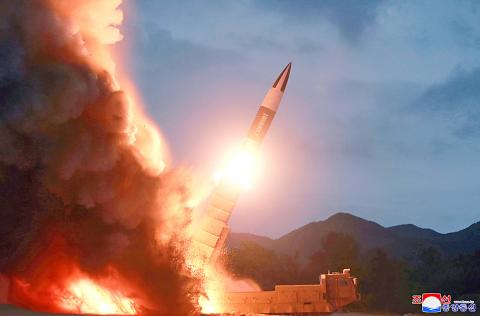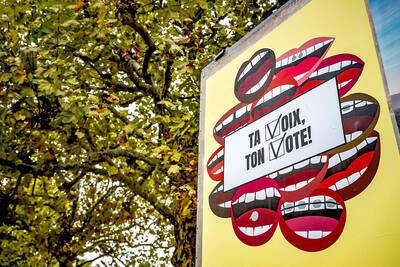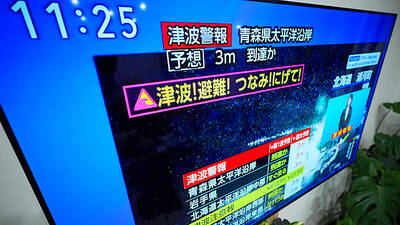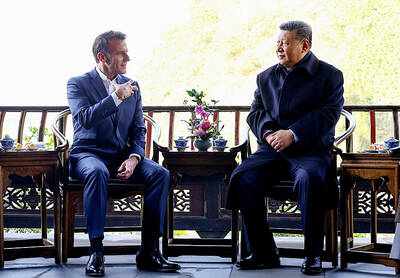UN experts have said that North Korea has increased imports and exports of banned and restricted goods, such as coal and petroleum products, as it continues to enhance its illicit nuclear and ballistic missile programs in violation of sanctions.
The experts identified new methods that the country is using to evade UN sanctions, including transferring 2.8 million tonnes of coal from North Korean-flagged vessels to Chinese barges that then headed to Chinese ports.
This would be a violation of an August 2017 UN Security Council resolution that bans all exports of coal, North Korea’s largest source of foreign exchange.

Photo: Reuters
The experts said the figures came from an unidentified member state, adding in a footnote: “A couple of experts are of the view that this information can be further corroborated.”
The Chinese UN Mission strongly rejected any claim that China violated sanctions, saying earlier this week that the country “has always faithfully and seriously fulfilled its international obligations and sustained huge losses and tremendous pressure in the process.”
The mission expressed “indignation and concern” at the leaking of the experts’ report, which is not due to be made public until next month.
The summary and parts of the 67-page report, seen on Friday by The Associated Press, said that the Democratic People’s Republic of Korea (DPRK) continued the construction and maintenance of nuclear facilities, although it did not carry out any nuclear tests or tests of intercontinental ballistic missiles last year.
It did conduct 13 other launches of at least 25 missiles, including new types, the experts said.
The panel stressed the link between North Korea’s nuclear program and its illegal exports, especially of coal.
“The DPRK’s continued violation of commodity export bans not only flouts Security Council resolutions, but serves to fund a revenue stream that has historically contributed to the country’s prohibited nuclear and ballistic missile programs,” the experts said.
The panel said that North Korea also continues to violate UN resolutions through its illicit import of refined petroleum products through ship-to-ship transfers and direct deliveries by foreign-flagged vessels.
These vessels sail directly into Nampo, the main North Korean port for petroleum deliveries, it said.
“In some months between June and October 2019, the estimated deliveries by foreign-flagged tankers exceeded deliveries made by the DPRK tankers,” the experts said.
The panel said it received a report from the US containing imagery, data and calculations of petroleum imports from January through Oct. 31 last year.
According to the experts, under three different scenarios based on how full tankers were, the US said the deliveries would have amounted to between three and eight times more than the 500,000-barrel annual cap on refined petroleum products set by the UN Security Council in December 2017.
“The Russian Federation and China requested more conclusive evidence to make a judgment,” the experts said.
They said that Russia reported exporting 30,886 tonnes of refined petroleum products to North Korea during the first 11 months of last year and China reported exporting 22,739 tonnes during the year.
The panel said it calculated that the total of Russian and Chinese export amounts would equal 408,576 barrels of refined petroleum products — below the annual limit.
As for coal, the panel said that according to the unidentified member state, North Korea “exported 3.7 million metric tons of coal between January 2019 and August 2019, with an estimated value of $370 million.”
Discussing new sanctions evasion methods to export coal, the panel first cited the use of “self-propelled barges” that are more than 100m in length and can undertake ocean voyages.
It also cited the use of larger foreign-flagged bulk carriers to deliver coal from North Korean-flagged vessels, as opposed to transferring coal to smaller lighter vessels for delivery.
It said a bulk carrier destined for scrap is suspected of being acquired by North Korea to illicitly export coal.
The panel said that North Korea also continues to use previous evasion tactics, such as “indirect routing, detours, loitering and the use of false documentation when transporting DPRK origin commodities,” to make it appear that banned commodities were loaded in ports other than in North Korea.
North Korea also continues to import other banned items, such as luxury vehicles, alcohol and robotic machinery, and it continues to send information technology workers abroad, including to Nepal, the experts said.
The panel said it also investigated several advertisements and exhibitions in China and Hong Kong of the artwork of North Korea’s Mansudae Art School, which is on the sanctions blacklist.

A plan by Switzerland’s right-wing People’s Party to cap the population at 10 million has the backing of almost half the country, according to a poll before an expected vote next year. The party, which has long campaigned against immigration, argues that too-fast population growth is overwhelming housing, transport and public services. The level of support comes despite the government urging voters to reject it, warning that strict curbs would damage the economy and prosperity, as Swiss companies depend on foreign workers. The poll by newspaper group Tamedia/20 Minuten and released yesterday showed that 48 percent of the population plan to vote

PARLIAMENT CHAOS: Police forcibly removed Brazilian Deputy Glauber Braga after he called the legislation part of a ‘coup offensive’ and occupied the speaker’s chair Brazil’s lower house of Congress early yesterday approved a bill that could slash former Brazilian president Jair Bolsonaro’s prison sentence for plotting a coup, after efforts by a lawmaker to disrupt the proceedings sparked chaos in parliament. Bolsonaro has been serving a 27-year term since last month after his conviction for a scheme to stop Brazilian President Luiz Inacio Lula da Silva from taking office after the 2022 election. Lawmakers had been discussing a bill that would significantly reduce sentences for several crimes, including attempting a coup d’etat — opening up the prospect that Bolsonaro, 70, could have his sentence cut to

A powerful magnitude 7.6 earthquake shook Japan’s northeast region late on Monday, prompting tsunami warnings and orders for residents to evacuate. A tsunami as high as three metres (10 feet) could hit Japan’s northeastern coast after an earthquake with an estimated magnitude of 7.6 occurred offshore at 11:15 p.m. (1415 GMT), the Japan Meteorological Agency (JMA) said. Tsunami warnings were issued for the prefectures of Hokkaido, Aomori and Iwate, and a tsunami of 40cm had been observed at Aomori’s Mutsu Ogawara and Hokkaido’s Urakawa ports before midnight, JMA said. The epicentre of the quake was 80 km (50 miles) off the coast of

RELAXED: After talks on Ukraine and trade, the French president met with students while his wife visited pandas, after the pair parted ways with their Chinese counterparts French President Emmanuel Macron concluded his fourth state visit to China yesterday in Chengdu, striking a more relaxed note after tough discussions on Ukraine and trade with Chinese President Xi Jinping (習近平) a day earlier. Far from the imposing Great Hall of the People in Beijing where the two leaders held talks, Xi and China’s first lady, Peng Liyuan (彭麗媛), showed Macron and his wife Brigitte around the centuries-old Dujiangyan Dam, a World Heritage Site set against the mountainous landscape of Sichuan Province. Macron was told through an interpreter about the ancient irrigation system, which dates back to the third century